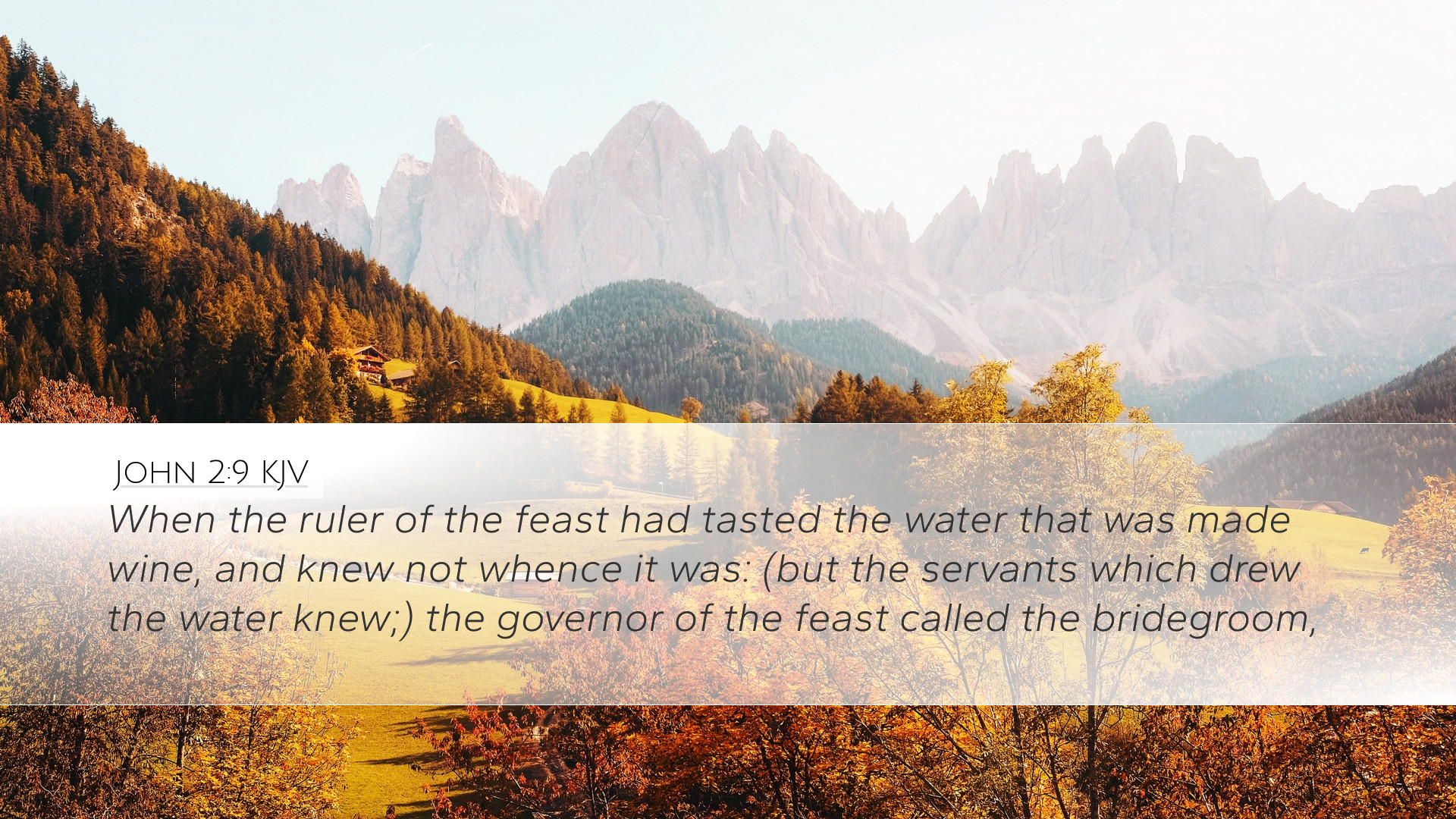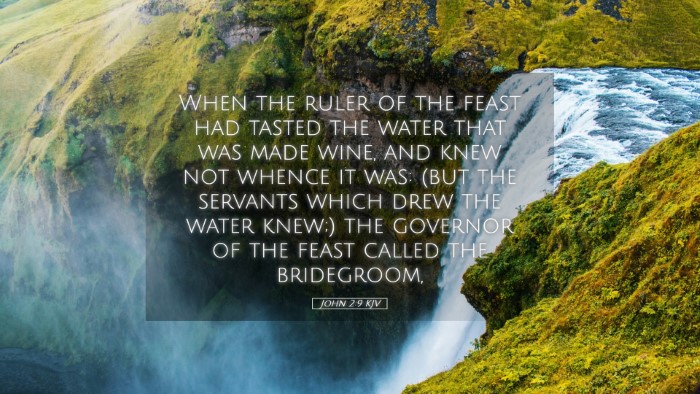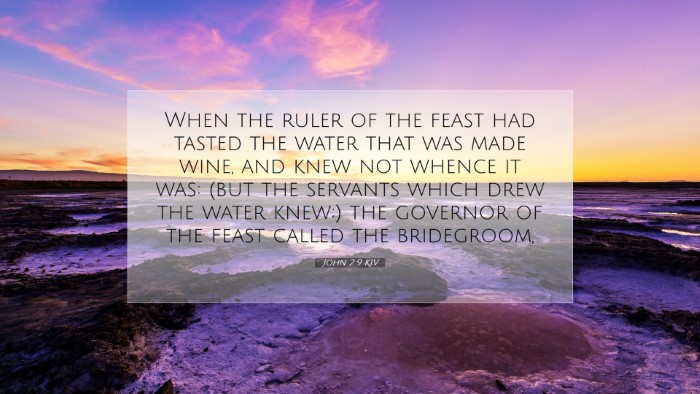Old Testament
Genesis Exodus Leviticus Numbers Deuteronomy Joshua Judges Ruth 1 Samuel 2 Samuel 1 Kings 2 Kings 1 Chronicles 2 Chronicles Ezra Nehemiah Esther Job Psalms Proverbs Ecclesiastes Song of Solomon Isaiah Jeremiah Lamentations Ezekiel Daniel Hosea Joel Amos Obadiah Jonah Micah Nahum Habakkuk Zephaniah Haggai Zechariah MalachiJohn 2:9
John 2:9 KJV
When the ruler of the feast had tasted the water that was made wine, and knew not whence it was: (but the servants which drew the water knew;) the governor of the feast called the bridegroom,
John 2:9 Bible Commentary
Commentary on John 2:9
John 2:9 states, “When the ruler of the feast had tasted the water that was made wine, and knew not whence it was: but the servants which drew the water knew: the governor of the feast called the bridegroom.” This verse serves as a pivotal point in the narrative of Jesus’ first miracle at the wedding in Cana, revealing profound theological insights and practical applications.
Historical Context
The setting of this passage is a wedding feast in Cana, which reflects the joy and celebration of marriage in Jewish culture. Weddings were significant social events, often lasting several days. Wine was essential to these celebrations, symbolizing joy and abundance.
Spiritual Significance
The miracle of turning water into wine not only signifies Jesus’ divine authority but also illustrates the transformative power of His ministry. As Matthew Henry notes, “This miracle is a sensible representation of the gospel, which turns our sorrow into joy.” Here, we see that Christ does not merely provide but transforms, indicating His ability to change the hearts and lives of those who believe in Him.
Insights from Commentaries
-
Matthew Henry:
Henry emphasizes the humility and subtlety of Christ’s miracle. The governor of the feast, unaware of the wine’s origin, represents humanity’s ignorance of divine workings. Henry notes, “The servants knew, while the masters were kept in the dark, to show that the wisdom of this world knows not the ways of God.” This speaks to the nature of faith—relying on what is revealed versus what is perceived.
-
Albert Barnes:
Barnes points out the significance of the governor’s recognition of the wine’s quality. He suggests that the miracle emphasizes the richness of Christ’s blessings. “The ruler of the feast called the bridegroom,” underscores the truth that Jesus provides abundantly even from the most ordinary sources. The best wine was saved for last, paralleling the idea that God’s final acts are greater than His initial, affirming that in Christ, the best is yet to come.
-
Adam Clarke:
Clarke provides critical insight into the reaction of the wedding guests and the cultural implications. He discusses how the ruler’s praise for the wine reflects an understanding of quality over quantity, correlating this to the character of Christ’s ministry. “Jesus, through this act, demonstrates His power to not only provide but to restore joy and elevate human experiences,” Clarke writes, inviting believers to understand that Christ enhances life’s celebrations.
Theological Implications
This passage demonstrates several theological themes:
-
Transformation:
The transformation of water into wine symbolizes the transformative nature of Christian faith. Just as Christ turned the mundane into the extraordinary, believers are called to experience a similar transformation in their lives through the grace of God.
-
Revelation of Christ’s Glory:
John 2:11 states that this miracle manifested His glory. Commentators agree on the importance of recognizing Jesus' divinity and authority. Matthew Henry suggests that the miracle served to “establish the faith of His disciples and reveal His character” as the promised Messiah.
-
Blessing of Abundance:
The abundance of wine serves as a metaphor for God's blessings. The act of providing the best wine reflects God’s generosity and abundant grace in the lives of believers, inviting them into a deeper relationship with Him.
Practical Applications
This miraculous event encourages followers of Christ to consider their own lives and how they may allow God to transform the ordinary into the extraordinary. The following applications can be drawn:
-
Faith in the Unexpected:
Like the servants who knew the truth about the wine, believers are called to have faith in God’s work even when it is unseen by the world.
-
Celebrate God’s Goodness:
This passage encourages Christians to celebrate God’s blessings with joy and gratitude, recognizing His goodness in every situation.
-
Service to Others:
As the servants played a crucial role in this miracle, Christians are reminded of the importance of serving others and being vessels through which God’s love and grace can flow into the world.
Conclusion
John 2:9 encapsulates rich theological insights and profound implications regarding the nature of Jesus’ ministry. This miracle at Cana is not merely a display of power; it invites believers to experience the transformative joy that comes from faith in Christ. By examining this verse through the lens of historical context, spiritual significance, and the insights of respected commentators, pastors, students, and scholars can glean a deeper understanding of the heart of Christ—His desire to bring joy, transformation, and abundant life to all who believe.


